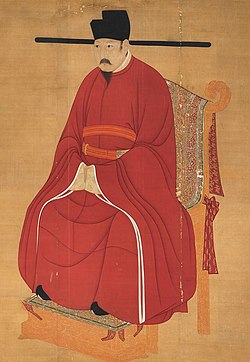Emperor Renzong of Song
| Emperor Renzong of Song |
|||||||||||||
|---|---|---|---|---|---|---|---|---|---|---|---|---|---|

|
|||||||||||||
| Emperor of the Song dynasty | |||||||||||||
| Reign | 24 March 1022 – 30 April 1063 | ||||||||||||
| Predecessor | Emperor Zhenzong | ||||||||||||
| Successor | Emperor Yingzong | ||||||||||||
| Born | Zhao Shouyi (1010–1018) Zhao Zhen (1018–1063) 30 May 1010 |
||||||||||||
| Died | 30 April 1063 (aged 52) | ||||||||||||
| Empresses |
Empress Guo Empress Cao |
||||||||||||
| Concubines | Consort Zhang Consort Miao Consort Zhou Consort Yang Consort Yu Consort Dong Consort Zhang Consort Zhang Consort Zhu Consort Zhang Consort Lian Consort Yang |
||||||||||||
| Issue |
|
||||||||||||
|
|||||||||||||
| House | House of Zhao | ||||||||||||
| Father | Emperor Zhenzong | ||||||||||||
| Mother | Consort Li | ||||||||||||
| Era dates | |
|---|---|
| Tiansheng (天聖; 1023–1032) Mingdao (明道; 1032–1033) Jingyou (景祐; 1034–1038) Baoyuan (寶元; 1038–1040) Kangding (康定; 1040–1041) Qingli (慶曆; 1041–1048) Huangyou (皇祐; 1049–1053) Zhihe (至和; 1054–1056) Jiayou (嘉祐; 1056–1063) |
|
| Posthumous name | |
| Titian Fadao Jigong Quande Shenwen Shengwu Ruizhe Mingxiao Huangdi (體天法道極功全德神文聖武睿哲明孝皇帝) (awarded in 1083) |
|
| Temple name | |
| Renzong (仁宗) |
| Emperor Renzong of Song | |||||||||
| Chinese | 宋仁宗 | ||||||||
|---|---|---|---|---|---|---|---|---|---|
| Literal meaning | "Humane Ancestor of the Song" | ||||||||
|
|||||||||
| Zhao Zhen | |||||||||
| Traditional Chinese | 趙禎 | ||||||||
| Simplified Chinese | 赵祯 | ||||||||
|
|||||||||
| Zhao Shouyi | |||||||||
| Traditional Chinese | 趙受益 | ||||||||
| Simplified Chinese | 赵受益 | ||||||||
|
|||||||||
| Transcriptions | |
|---|---|
| Standard Mandarin | |
| Hanyu Pinyin | Sòng Rénzōng |
| Wade–Giles | Sung4 Jen2-tsung1 |
| Transcriptions | |
|---|---|
| Standard Mandarin | |
| Hanyu Pinyin | Zhào Zhēn |
| Wade–Giles | Chao4 Chen1 |
| Transcriptions | |
|---|---|
| Standard Mandarin | |
| Hanyu Pinyin | Zhào Shòuyì |
| Wade–Giles | Chao4 Shou4-i4 |
Emperor Renzong of Song (30 May 1010 – 30 April 1063, Chinese calendar: 14 April 1010(the 3rd year of Dazhongxiangfu, 大中祥符三年) - 29 March 1063 (the 8th year of Jiayou, 嘉祐八年)), personal name Zhao Zhen, was the fourth emperor of the Song dynasty in China. He reigned for about 41 years from 1022 to his death in 1063, and was the longest reigning Song dynasty emperor. He was the sixth son of his predecessor, Emperor Zhenzong, and was succeeded by his cousin's son, Emperor Yingzong, because his own sons died prematurely. His original personal name was Zhao Shouyi but it was changed by imperial decree in 1018 to "Zhao Zhen", which means 'auspicious' in Chinese.
Compared to other famous Chinese emperors, Emperor Renzong is not widely known. His reign marked the high point of Song influence and power but was also the beginning of its slow disintegration that would persist over the next century and a half. One possible reason behind its weakness is its interpretation of its own foreign policy. The official policy of the Song Empire at the time was one of pacifism and this caused the weakening of its military. The Tangut-led Western Xia state took advantage of this deterioration and waged small scale wars against the Song Empire near the borders.
When Emperor Renzong came to power, he issued decrees to strengthen the military and paid massive bribes to the Khitan-led Liao dynasty, an adversary of Western Xia, in the hope that this would ensure the safety of the Song Empire. However, these policies involved a heavy price. Taxes were increased severely and the peasants lived in a state of perpetual poverty. This eventually caused organised rebellions to take place throughout the country and the breakdown of the Song government.
However, according to the records of History of Song, Renzong was considered to be merciful, tolerant, modest and frugal, and seldom revealed his feelings on expressions. One popular folk story of him was about that Emperor Renzong felt hungry one night and was eager to eat mutton. When the servant was about to ordered the cooks to prepare, Renzong stopped him, explained that this may cause waste if the cook kept cooking mutton from then on, and he preferred to suffer hunger rather than waste too much. Renzong ordered that officers of government must be very cautious to use death penalty, and if an officer once wrongly sentenced an innocent person to death, he would never get promoted. Renzong once said to his near ministers that: "I have never used the word 'death' to scold others, how dare I abuse the death penalty?"
...
Wikipedia
